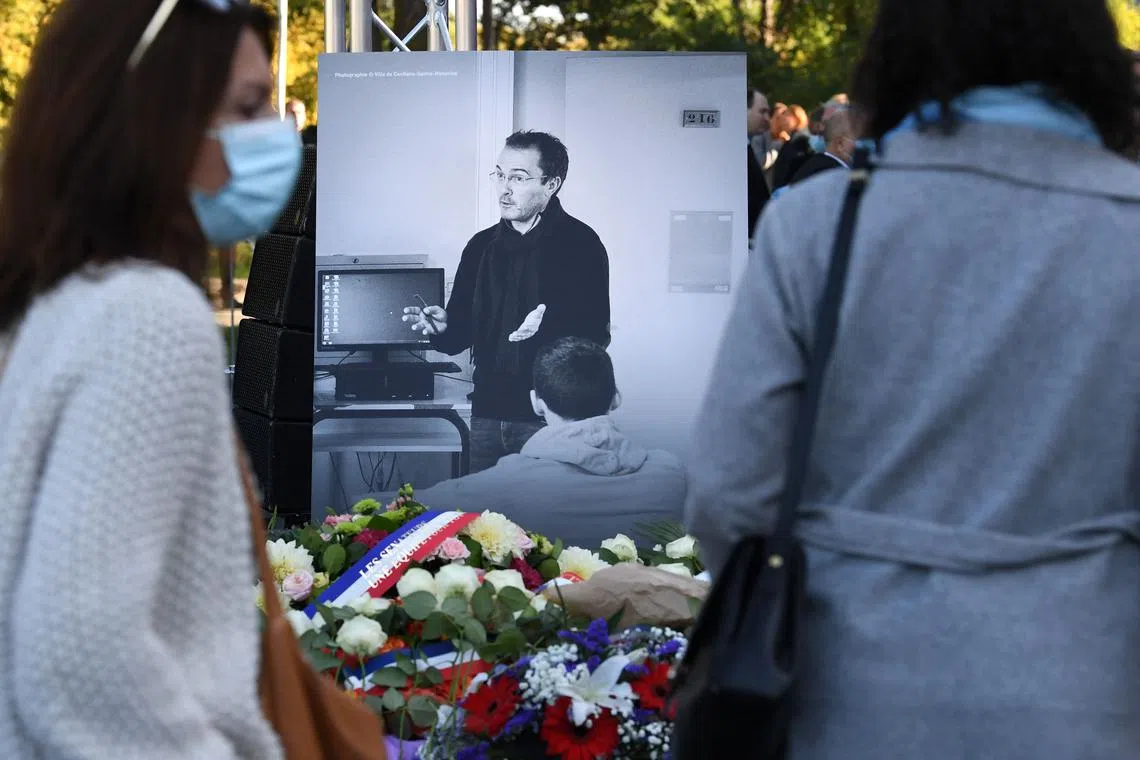French prosecutors seek jail terms of up to 16 years in trial over beheaded teacher
Sign up now: Get ST's newsletters delivered to your inbox

Samuel Paty was killed in October 2020 by 18-year-old Abdoullakh Anzorov.
PHOTO: AFP
Follow topic:
PARIS - French anti-terror prosecutors on Dec 16 sought jail terms of between one and 16 years for eight people on trial over the 2020 beheading of a school teacher
The harshest sentence was reserved for a defendant accused of joining a terrorist enterprise helping to prepare the murder of Mr Samuel Paty after the teacher showed cartoons of the Prophet Mohammed in class.
Mr Paty became a free speech hero to the French authorities following his beheading in October 2020 by Abdoullakh Anzorov, an 18-year-old of Chechen origin who died in a shoot out with the police.
Prosecutors had earlier downgraded “complicity in terrorist murder” charges carrying up to a life sentence for Anzorov’s friends Naim Boudaoud, 22, and Azim Epsirkhanov, 23.
But the prosecution insisted that both should still be found guilty of “membership in a terrorist organisation” punishable by a maximum of 30 years’ jail, demanding the 16-year term for Epsirkhanov.
Both are suspected of giving Anzorov logistical support, including to buy weapons.
Epsirkhanov admitted he had received €800 euros (S$1,135) from his fellow Chechen Anzorov to find him a real gun but had not succeeded.
Boudaoud – who prosecutors demanded a 14-year term for – is accused of accompanying Anzorov to buy two replica guns and steel pellets on the day of the attack.
Prosecutor Marine Valentin said in her closing statement that the accused had been “fully aware” of Anzorov’s “jihadist convictions” when they helped him.
But Ms Valentin said that there was no absolute certainty that they had meant to participate in the preparation of terrorist murder.
Earlier another prosecutor, Mr Nicolas Braconnay, had already cautioned that the prosecutors’ stance may “not completely meet the expectations” of Mr Paty’s family.
All the defendants on trial since November were charged with contributing to the climate of hatred that led to the gruesome killing of the 47-year-old history and geography teacher.
Prosecutors also called for a 10-year sentence for Brahim Chnina, a 52-year-old Moroccan father of a schoolgirl who falsely claimed that Mr Paty had asked Muslim students to leave his classroom before showing the caricatures.
Then aged 13, she was not actually in the classroom at the time and earlier in the trial apologised to her former teacher’s family.
Abdelhakim Sefrioui, a 65-year-old Franco-Moroccan Islamist activist, also faces up to 12 years in jail if convicted.
He and Chnina spread the teenager’s lies on social networks with the aim, according to the prosecution, of “designating a target”, “provoking a feeling of hatred” and “thus preparing several crimes”.
Both men have been in pre-trial detention for the past four years.
Between Oct 9 and Oct 13, Chnina spoke to Anzorov nine times by telephone after he published videos criticising Mr Paty, the investigation showed.
Sefrioui posted a video criticising what he considered to be Islamophobia in France and describing Mr Paty as a “teaching thug”, but told investigators he was only seeking “administrative sanctions”.
But prosecutor Mr Braconnay dismissed the claim on Dec 16, saying both men should be found guilty of participating in a terrorist enterprise.
“Nobody is saying that they wanted Samuel Paty to die”, the prosecutor said. “But by lighting thousands of fuses online, they knew that one of them would lead to jihadist violence against the blasphemous teacher.”
Prosecutors recommended prison terms of one to five years for four other defendants, including one suspended sentence of 18 months.
They are accused of belonging to a network of jihadist sympathisers around Anzorov spreading inflammatory content online.
Mr Paty had used the cartoons, first published in Charlie Hebdo magazine, as part of an ethics class to discuss free speech laws in France, where blasphemy is legal and cartoons mocking religious figures have a long history.
His killing took place just weeks after Charlie Hebdo republished the Prophet Mohammed cartoons.
After the magazine used the images in 2015, Islamist gunmen stormed the magazine’s offices, killing 12 people.
Four other defendants interacted with Anzorov online. AFP

